Although New York often thinks of herself as the origin of all things, such hubris ignores the reality that Gotham’s skill is as arbiter: to pick and choose among the worthy green shoots and then convince herself that they were to be found in New York all along. All the arts know this trick: Manhattan always trumps regional genius in its own imagination.
Nowhere is this more true than in gastroland: Nuevo-Caribbean cuisine from mango Miami, molecular cuisine from Barcelona and Chicago, New Orleans haute-cajun, and the list continues. But perhaps when the final history of cuisine is Kindled no patch of land will deserve more credit for culinary innovations than the Bay Area, the engine of American gastronomic theory and practice.
In a recent trip to San Francisco, I dined at two canonical restaurants: Chez Panisse (for the third time) and the French Laundry (as a FL virgin, but having eaten at Per Se three times). I also had a fine meal at Restaurant Gary Danko, but as Danko is “only” a fine rendition of well-established national trends in modern American cuisine I won’t discuss Chef D’s efforts.
Diners have their own emotional equations. A lover of the Chez Panisse might sniff at the French Laundry and the reverse. I lay my cards on the table. I have long respected Chez Panisse but never loved her (not in 1985, not in 1995, and not in 2009). Yes, I celebrate CP’s importance in birthing restaurants that I love. I recognize CP’s importance as a social movement in changing (for the better, mostly) how Americans think about food production and dining including by White House compost pile, but I have never had a “wow” moment. Leaving CP I have felt, “Gosh, this is flawless; where can I find a really good taco”? In contrast, Per Se and, now, French Laundry are me. I am in love. And if only they would use fewer quotation marks on their menu, saving gallons of imported ink, I would lack quibbles.
Despite the fact that Chez Panisse famously developed from the hippy-dippy movements of the 1960s, Panisse seems less Aquarian than Calvinist. Stripped down, lean, and clean; like dining in a Presbyterian chapel. Throwing out the capital-G gourmet frou-frou is valid to a point: it is about the food. But it is also about the show, about the excess, about the awakenings, about the ability to astonish. In Keller’s haute-farmhouse there is magic afoot.
Chez Panisse changes the menu each night. This is an impressive feat. Applause. But since diners do not eat there every night, they take their chances. Some dishes click loudly; others more softly; and few are discordant. These constantly shifting, micro-seasonal menus mean that chefs cannot perfect dishes over time, and they cannot routinely present their brilliancies. Even a chef like Alice Waters and her cooks aren’t geniuses every evening. Even Einstein needs a break. As a result provenance and produce replace art. So it was on the evening of August 11, 2009. A review from August 12th, much less December 12th could be quite different. Dinners differ by day of the week, just like New York Times crosswords – Monday is simple, Friday and Saturday more extensive. CP can duck criticism because the failed dish may never be seen again. (Playwright Suzi-Lori Parks attempted to write and then have theaters produce a play for each day of the year. Not surprisingly some were clunkers for which audiences laid down their cash).

On Tuesday August 11th, we began with a chilled tomato and cucumber soup with avocado. It was an August 11th soup. Not exactly gazpacho in that the ingredients were present for our gaze: showing off a garden-fresh ideology. This was as delightful as any a cold vegetable soup that I have tasted. It was plated to remind the diner of just how fortunate they were to be served this kind of produce. Fundamentally it was not so very different from a soup that I might have made if I had such a network of gifted farmers.
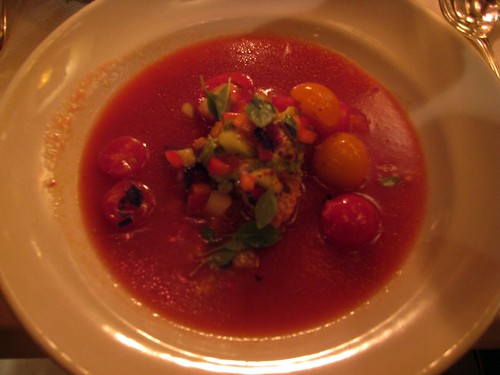
The second course was a local petrale sole à la ciboulette (chives). What simple perfection! Sauteed, lightly battered, a mild lemon sauce, sprinked with chives. What is not to like? This is the kind of dish that is Chez Panisse to the core. How hard can it be to cook sole – but flawless? Despite (or because of?) its Puritanism, its lack of show, it was the high point of the night.

The next dish, however, revealed CP’s limits. I admit that the main courses on Monday, Thursday, and Friday sounded enticing, but this was Tuesday: Spit-roasted Becker Lane Ranch pork loin with fresh summer shell beans and chanterelle mushrooms. I have never had a poorly made dish on Shattuck Avenue and this was no exception. However, despite the quality of the pork and beans (not deconstructed, but simply shared), it had no depth of flavor (although the onion rings certainly were applause-worthy). It lacked savory memory.
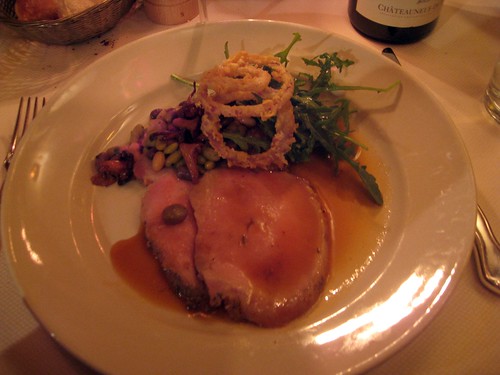
Dessert was Middleton Gardens raspberry ice cream crêpes. They were as advertised if you treat the excellent peaches and blackberries as lagniappe. At Chez Panisse, the ingredients are generous. Think of a raspberry crepe, and then think of a raspberry crepe with perfect fruit. That is Chez Panisse.
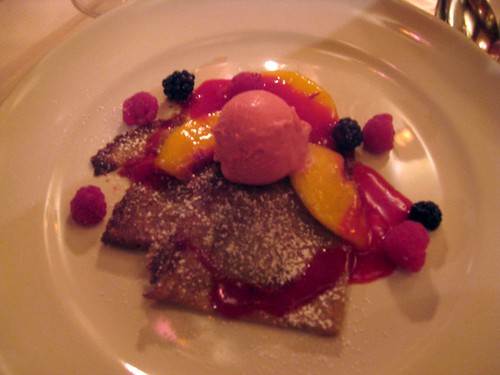
The idea of Chez Panisse is transformative, but unlike the greatest meals in my life, the food isn’t. Still, we must consider price. Turning to The French Laundry and its fireworks means traversing from a $75 prix fixe without service to one set at $240 (service included). For two icons in these days of economic meltdown, that is not a difference to be ignored. Berkeley profs can afford Chez P.
But forget cost if you can. Eat until the trust fund is no more. While Chez Panisse advertises the idea of local dining, on the following night (August 12th for the record) I tried to discern differences between French Laundry’s menu and that of Per Se. Different spaces but similar vision. While the ingredients – particularly the produce – are likely to be differently sourced and each restaurant has its own chef de cuisine (Timothy Hollingsworth at FL and Jonathan Benno at PS, although the restaurants are in continual video communication), similarities outweigh differences, beginning with Keller’s signature “Oysters and Pearls” – a “Sabayon” of pearl tapioca with Island Creek oysters and white sturgeon caviar. The dish is as definitive as ever: the great post-modern classic. (Amuses were an ethereal Gruyere gougere and a cornet of Scotch salmon, spring onion crème fraiche and a nicely spicy black pepper tuile.)

The menu at French Laundry is largely fixed, although diners choose between the Chef’s Tasting Menu and the Tasting of Vegetables (neither vegetarian nor kosher, as FL announces Lobster Bouillon and Ibérico Ham on this menu). Within the nine-course menu, diners can choose from a pair of selections for four courses (and can choose the occasion course from the other menu).
The first post-O&P course was an astonishing salad of compressed melon (a dish selected from the vegetable tasting menu) with Niçoise olives, charred scallions, arugula and verbena “aigre-doux” (sour/sweet). Of all of the skills of Keller’s minions, the composition of the dishes is unique. It is not that Keller produces the most beautiful plates or the most architectural, but his are the plates in which the placement of ingredients reveals exquisite sensitivity towards the inventive power of shape.

My companion selected a degustation of French Laundry garden potatoes with Australian black truffles, picked pearl onions, celery branch, nasturtium and crème fraiche. While the presentation was deliberately minimalist, one could not fault the Panisse-like quality of ingredients while also recognizing a distinct combination of tastes.

The first fish course was a flavor-confection centered around Chesapeake Bay soft-shell crabs with marinated eggplant, pleasantly bitterly pungent red radishes, navel orange pips, mizuna, and miso vinaigrette. I was entranced by this careful composition. This was another favorite dish in a list of favorites. There is a sculptural intensity that characterizes Chef Keller’s presentations, but also an intensity of flavor: a wisdom that recognized that crab, radish, oranges, and eggplant might make for a perfect Wednesday evening.
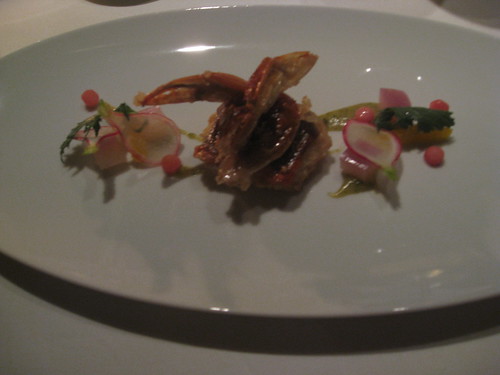
The other fish dish, sautéed fillet of Columbia River sturgeon with “pain de Campagne,” toybox tomatoes, little gem lettuces, Spanish capers, and “bottarga di muggine,” reveled a fillet a little more cooked than perhaps it ought and with a somewhat minimalist background. I found this the least compelling plate of the night. It didn’t sing or zing.

Maine lobster tail “pochée au beurre doux” with mission figs, Cipollini onions, scallions, and chocolate-coffee sauce was heroic with the unlikely but stirring partnership of buttery lobster and choco-coffee. Consuming this shellfish reminded me of watching Hamlet performed in rap: we know the traditional text and can enjoy how modernity plays tribute to tradition.

We had two choices for the first meat course: Salmon Creek Farms Pork Belly with Savoy spinach, chick (or chic!) peas, spicy paprika, and Meyer lemon condiment worked hard to please. My photo does not do the dish justice, but this was the night’s least photogenic plate. Still, the richly tart lemon made for a very nice counterpoint to the fatty, deep pork. A very satisfying dish, even if short of astonishing.
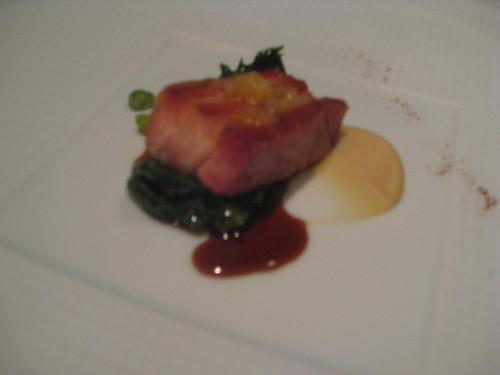
The second option was preferable: a gemlike combination of “épaule (shoulder) de lapin farcie aux ris de veau with Jacobsen’s Farm Pears, hazelnuts, watercress and summer truffles. A brief editorial: Why provenance the pears? Does knowing that they were reared by some farmer in the dell’s orchard improve my pleasure? True, all pears, even American ones, are not created equal, but wouldn’t the variety of pear be more important than their human parent. End of rant. And back to this treasured dish with its wonderful August truffle and oh-so-sweetbreads. With its novel utensil this was the dish most reminiscent of Alinea, but wherever FL’s inspiration, it was inspired.

The menu’s centerpiece was Snake River Farms “Calotte de Boeuf (an often ignored cut of beef surrounding the ribeye) Grillée” with globe artichokes, Nantes carrots, garlic “croquante,” parsley shoots and sauce barigoule, a sauce traditionally napping artichokes, a nod to classical cuisine. This was not an exotic adventure, but a dish with enormous integrity. Not as simple in presentation as dishes at Chez Panisse, it evinced equal respect for produce. Minimalist, each bit was revealing. Of all the courses in this evening of pleasures the honest grilled beef demonstrated the long and warm shadow of Alice Waters. Without her brave fight, the French Laundry could never be.

Our cheese course was “Tomme du Berger” (a soft, nutty, “fragrant” cheese) with hen-of-the-woods mushrooms, sweet peppers, haricots verts, and arugula. It was an ideal follow-up to the beef. This was another quiet, intense course that bowed to the integrity of the ingredients. One does not need a plate of cheeses to conclude: cheese matters.
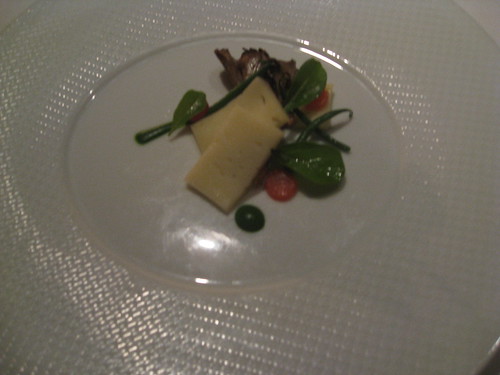
Honeydew melon sorbet with compressed red and yellow sorbet and basil “nuage” (a “cloud” or light foam) reprised the early melon dish. It was a very pleasant palate cleanser.

For dessert my companion ordered the “Ballon de Chocolate Fumé” with smoked black tea, vanilla ice cream and tonka bean caramel. He was presented with a chocolatty bocce ball. My small taste suggested a Cadillac of sundaes.

I decided upon lemon verbena “vacherin” (a meringue base) with Tellicherry pepper panna cotta, lemon verbena sherbet, and chilled Silverado Trail strawberry consommé. This composition was another favorite with clever shapes, vivid colors, surprising textures, and sensuous tastes. This sweet revealed a complexity that announced that whatever the debt of Chef Keller to Chef Waters, his cuisine is more challenging and remarkable in its visionary potential. Keller’s vacherin was a splendid closing to edge me into the cool, still, verdant, small-town Yountville night.

Service at both restaurants was warm in a way that only Californians have perfected.
Eating at Chez Panisse and French Laundry back-to-back is a one-two punch that might only be matched by consecutive meals at L’Arpege and El Bulli – but these Californians sit just across the bay. Cali rulz.
Chez Panisse
1517 Shattuck Avenue
Berkeley, CA
510-548-5525
http://www.chezpanisse.com
The French Laundry
6640 Washington Street
Yountville, CA
707-944-2380
http://www.frenchlaundry.com

3 comments:
I am with you on CP, Gary. If you want to go, go upstairs. The food is just as good, the prices reasonable. The French Laundry remains but a fantasy for me. Someday.
If you ever come back to the Bay Area, you should really try La Folie - just check the website for lots of images of their dishes - they are definitely very creative, and the chef worked on the east coast for a decade or so and then moved to San Francisco. Portion size they are somewhere between FL and CP.
Thank You.....
Your blog is very informative and I will keep updated with the
same.
Restaurants in Delhi
Post a Comment